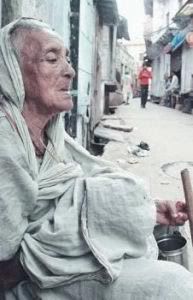Appearing at The Blogging Curmudgeon, My Left Wing, and the Independent Bloggers' Alliance. "Sanvean (I Am Your Shadow)" -- Dead Can Dance "If a woman's husband dies, let her lead a life of chastity, or else mount his pyre" -- Vishnu Smrti xxv.14 Last month, in the wake of the ghastly stoning death of D'ah Khalil Aswad, My Left Wing's Maryscott O'Connor wrote a passionate indictment of organized religion. Sure, I hate all organized religions. But I especially loathe those religions that use special modes of dress and behaviour to segregate women from men; in itself, that shouldn't mean much, but invariably when women are especially set apart from men, it is generally with the understanding that it is because women are either inferior or dangerous or "unclean." Witness the Hindu widows of India. They cannot remarry. They must not wear jewelry. They are forced to shave their heads and typically wear white. Even their shadows are considered bad luck. This legion of societal outcasts flock to the holy city, Vrindavan, to die. Their hope is to be finally freed from the wheel of karma; from the cycles of life and death. It is understood that Mathura City is the transcendental abode of Lord Krishna. It is not an ordinary material city, for it is eternally connected with the Supreme Personality of Godhead. Vrindavan is within the jurisdiction of Mathura and still continues to exist. Because Mathura and Vrindavan are intimately connected with Krishna eternally, it is said that Lord Krishna never leaves Vrindavan (vrindavanam parityajya padam ekam na gacchati). At present the place known as Vrindavana in the district of Mathura, continues its position as a transcendental place and certainly anyone who goes there becomes transcendentally purified. In 2000, film-maker Deepa Mehta began production of "Water." The third and final installment of her elements trilogy, it tells of the plight of widows in traditional India. The backdrop of the film is the rise of Mahatma Gandhi, who not only agitated for India’s independence from Britain but also sought to improve the lot of Hindu widows. Colonies like the one depicted in Water aren’t nearly as prevalent in modern India, but according to Mehta, they do still exist. Through advocacy and activism, however, Hindu widows have become more independent.  But, like all religions, much is in the interpretation, and in which of the contradictory texts you keep or reject. We remake our religions constantly in our image; those images shaped largely by the religious beliefs that underly them. Beliefs about the place of widows are so entrenched in Indian culture, that Mehta was unable to shoot the film there. (The movie was finally filmed in 2004 and in the more amenable location of Sri Lanka.) Because of outrage from fundamentalists -- who claimed the film was "anti-Hindu" -- Mehta was threatened and even burned in effigy. But, like all religions, much is in the interpretation, and in which of the contradictory texts you keep or reject. We remake our religions constantly in our image; those images shaped largely by the religious beliefs that underly them. Beliefs about the place of widows are so entrenched in Indian culture, that Mehta was unable to shoot the film there. (The movie was finally filmed in 2004 and in the more amenable location of Sri Lanka.) Because of outrage from fundamentalists -- who claimed the film was "anti-Hindu" -- Mehta was threatened and even burned in effigy.Burning women is another deeply entrenched Indian tradition. An ancient practice called "sati" (or "suttee") calls for widows to be burned on their husbands' funeral pyres. Now illegal, and rarely practiced, it finds its basis -- like the tradition which consigns widows to lives as social outcasts -- in ancient Hindu scripture. While this immolation was supposed to be a voluntary act of self-sacrifice, in practice women were often forced onto the pyres and tied down. In the late 1700s, affluent Brahman Ram Mohan Roy advocated for reform, and achieved a good deal of success. His arguments were theological in nature. In one of his hypothetical dialogs, he argued that, according to scripture, while widows were proscribed from remarriage, the basis for self-immolation was superseded by the admonition for them to become ascetics. In this point-counterpoint exploration he articulates the position of both the "advocate" and the "opponent" of burning living widows to death. Advocate.—You have made an improper assertion, in alleging that Concremation and Postcremation are forbidden by the Shastrus. Hear what Unggira [Angira—one of the seven rishis or sages of the Hindu tradition] and other saints have said on this subject. I suppose it's arguable that a life shorn of one's hair and begging on the street is better than burning to death, but not by much. As with all religious prescriptions and proscriptions, it's impossible to separate the ideology from the culture. Like in our own primarily Judeo-Christian culture which fixates on a few obscure references to homosexuality at the expense of the more prevalent message of charity, the emphasis says far more about greater cultural mores than scripture. The plight of the Hindu widows may be justified by scripture, but it has it's roots in economics and plain, old-fashioned misogyny. The core of the problem lies in what Indian sociologists call patrilocal residence -- the custom of Hindu brides marrying into their husbands' families, largely severing ties with their own. In many cases, especially when widowhood comes early, this leaves a woman dependent on in-laws whose main interest after her husband's death is to rid the family of the burden of supporting her. "The widow is more inauspicious than all other inauspicious things. At the sight of a widow, no success can be had in any undertaking; excepting one's mother, all widows are void of auspiciousness. A wise man should avoid even her blessings like the poison of a snake." -- Skanda Purana |
Saturday, July 7, 2007
Brides of Death
Subscribe to:
Post Comments (Atom)









1 comments:
Drivel. Unadulterated bigoted crap.
No idea about Hinduism as it is 'practiced' today. No clue about modern day India. No clue about Indian society even.
Googling questionable translations of ancient texts gleaned from even more questionable websites does not make you a scholar on Hinduism.
Your post contains about as much 'truth' as Deepa Mehta's thoroughly discredited movie (in India, of course...who cares what Oscar beards think about a culture they only read about in Jules Verne's fairy tales).
Post a Comment